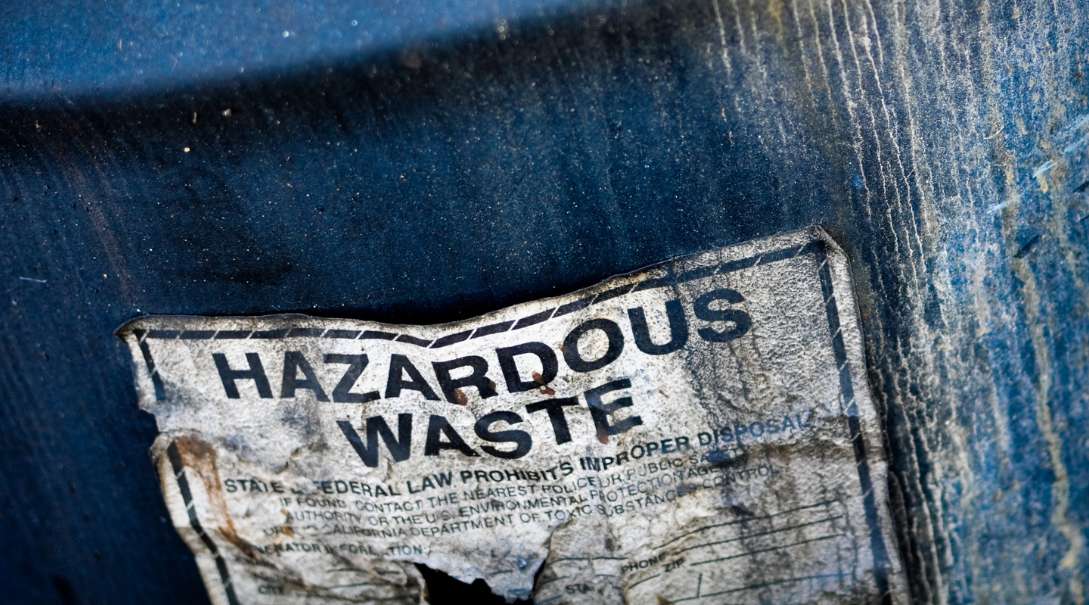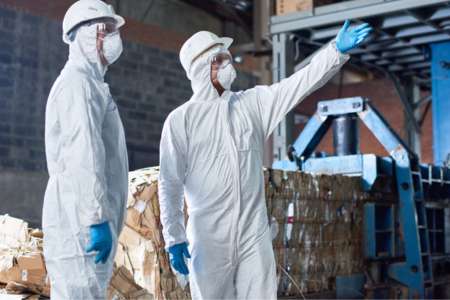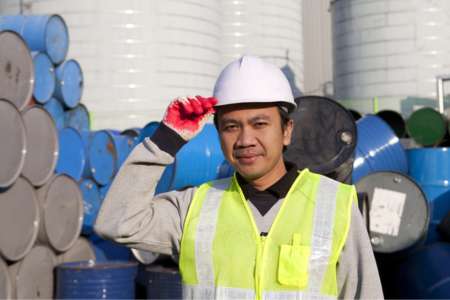If your company generates or stores hazardous waste, you should be familiar with the Resource Conservation and Recovery Act (RCRA). The RCRA requires that every employee understand the importance of hazardous waste regulations and how to comply with them.
RCRA training is critical for every employee who deals with RCRA hazardous waste and must be completed within six months of their hire date. This training may include a mixture of classroom instruction, online education, and on-the-job training. Companies must likewise maintain careful records to remain in compliance with the RCRA.
Here’s what you need to know about RCRA training requirements and how they impact your organization.
Table of Contents
Why Every Organization Needs to Prioritize RCRA Training
RCRA training is important for businesses as well as the individuals who staff them. This training aims to maintain safety, support sustainability, and help businesses comply with current regulations.
Proper training can improve safety in any workplace. With it, employees will better understand the proper handling, storage, and disposal of hazardous waste.
RCRA training can minimize workplace accidents and help protect your entire organization. It also provides accountability and direction so team members can assist one another in handling materials or dealing with spills.
Employees will be more engaged when they feel their company looks after their well-being. RCRA training may, therefore, have the added benefit of increased productivity in your workplace.
RCRA training also protects the environment. Current training protocols are designed to reinforce the best practices for storing and managing hazardous waste and prevent leaks and spills from contaminating the surrounding ecosystem’s air, soil, or groundwater.
Finally, RCRA training will ensure your business complies with the Resource Conservation and Recovery Act. For businesses that generate, handle, or store hazardous waste materials, RCRA training is required of every employee. Employers must likewise abide by strict recordkeeping and reporting requirements.
Because RCRA training relates to hazardous waste management, RCRA training will also contribute to compliance with other established regulations, such as the Pollution Prevention Act, which seeks to mitigate pollutants at their source.
AOTC’s Tailored Approach to Training
Because RCRA training is a high priority, it’s important to partner with a company offering industry-leading training programs.
AOTC employee training programs ensure your whole team has met federal requirements and each employee understands what it means to maintain environmental and safety standards on the job site.
RCRA training focuses on reinforcing core safety competencies, communicated through a program that includes:
- Lectures
- Multimedia presentations
- Exercises
- Competency evaluations
Along the way, instructors will work to identify risk factors and assist your teams in understanding the complexities of hazardous waste management. The goal is simple: to comply with established regulations and foster greater confidence in your employees’ ability to handle hazardous waste.
AOTC also understands not every company has the same needs. While the program will meet all established requirements, it can be further tailored to the specifics of your company and your exact needs.
Training Requirements
What are the RCRA training requirements? RCRA training covers policies and procedures specific to handling, storing, managing, and disposing of hazardous waste materials.
Common RCRA training requirements include instruction on areas that include the following:
- Identifying and characterizing solid waste and hazardous waste
- Selecting the appropriate hazardous waste container
- Proper marking and labeling of containers
- Quantifying hazardous waste and determining the status of the generator
- Safe handling and moving of waste or waste containers
- Proper inspection of containers
- Managing waste in satellite areas
- Reading and understanding current federal and local waste regulations
- Responding to emergency situations
- Scheduling waste shipments
- Maintaining inventory logs
Additionally, your organization must comply with the RCRA by maintaining careful training records. These records should include the following details regarding each employee who receives RCRA training:
- The employee’s name
- The employee’s job title
- The specific hazardous waste the employee deals with
- The date the employee completed the training
These RCRA training records must be stored and maintained on-site to remain in compliance.
As of 2023, the EPA increased the maximum civil penalty for RCRA hazardous waste violations to $87,855 per day, highlighting the practical urgency of complying with these training requirements.
Who Needs Training?
According to the Resource Conservation and Recovery Act, RCRA training is required of anyone who performs tasks related to hazardous waste and anyone who comes into contact with hazardous waste as part of their job duties.
These tasks can include:
- Identifying and characterizing hazardous waste
- Scheduling waste shipments
- Performing inspections
- Maintaining inventory logs
Common examples of those who need RCRA training include the following professionals:
- Facility operators
- Transporters
- Record keepers and inventory personnel
- Waste management technicians
- Supervisors and others who oversee waste management facilities
RCRA training requirements, therefore, extend to a broad range of employees who work in industrial settings where hazardous waste or other materials are common.
Employees must receive RCRA training within six months of their hire dates. Until they complete this training, the new employee must work under the direct supervision of an employee who has received it.
This short time frame is another reason to partner with outside training providers such as AOTC, as doing so will support swift, efficient compliance and eliminate the possibility of gaps in your compliance schedule.
How Often Is Training Required?
RCRA training is required of employees within six months of the day they are hired. They are also required to receive annual refresher training.
The EPA has not set forth guidelines regarding the length of these training courses. However, the best training providers will offer a tailored approach consisting of classroom instruction, multimedia presentations, and competency evaluations.
If an employee fails to receive this annual refresher training, your company may be in breach of RCRA compliance requirements. This risk showcases the importance of working with a devoted RCRA training partner like AOTC.
The Benefits of RCRA Training
Are there any practical benefits to RCRA training? There are numerous benefits to maintaining regular RCRA training protocols. Here are a few of the most important reasons you should prioritize quality RCRA training.
Improved Safety
Regular RCRA training ensures workers understand the basic procedures and the importance of proper handling and management of hazardous materials. With the right training, employers can expect fewer spills and accidents.
Additionally, this training advises employees on how to react to emergencies, improving the safety of your entire workforce.
Improved Industry Reputation
Employers can improve the reputation of their businesses by ensuring total compliance with RCRA training standards. Compliance demonstrates a company’s commitment to established standards and its dedication to worker safety.
RCRA training can establish your business as an organization that truly cares about the safety and well-being of its team members.
Improved Productivity
According to the best available research, workers will be more productive and engaged when employers prioritize their safety. Similarly, when employees are more confident in their ability to handle hazardous materials, they will be more able to focus on other areas of operation.
Reduced Legal Risk and Costs
EPA fines for noncompliance are steep, reaching as high as $87,855 per day. Maintaining RCRA compliance will prevent you from facing these penalties. It can also prevent lost revenue, ensuring your business stays in operation by adhering to all established standards.
Reduced Environmental Impact
RCRA training reduces the risk of spills and other critical hazards. As a result, your company will pose a lower risk to the environment.
The last thing any business owner wants to learn is that their company contributed to environmental damage. And if your company depends on its reputation for adhering to sustainable business practices, RCRA training is all the more important.
Get Started With RCRA Training
In today’s environmentally conscious world, RCRA training is critical for maintaining your company’s reputation. It’s also essential for complying with established EPA standards. Therefore, it’s not a matter of whether your staff should be trained in RCRA; it’s a matter of getting the best training possible to keep your organization safe and compliant.
Are you confident your business is in full compliance? If not, it may be time to consider RCRA training programs for your team members. AOTC brings advanced training programs to businesses like yours and tailors them to your unique needs.
Our safety and compliance training specialists offer programs that adhere to established standards while aligning with your company’s mission and goals. Ongoing education can ensure you and your team comply with all legal requirements and learn more about evolving standards.
To learn more about AOTC’s services and how you can stay up to date, visit our training page today or contact us to speak to a specialist.


